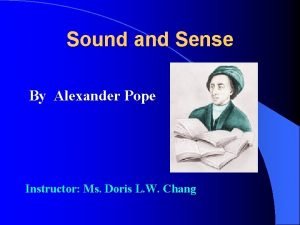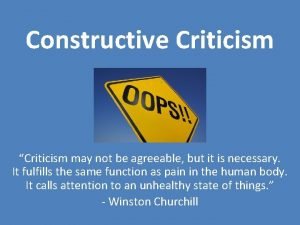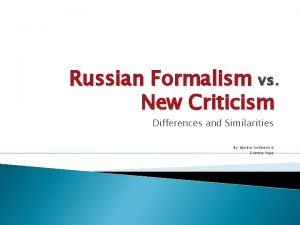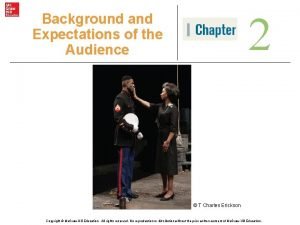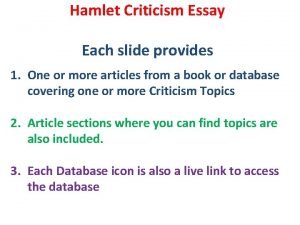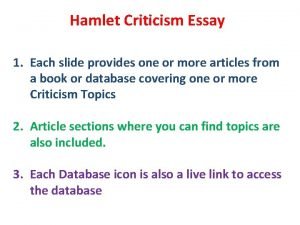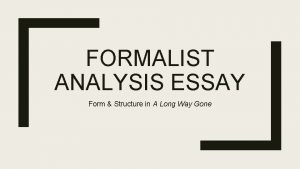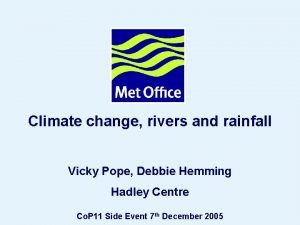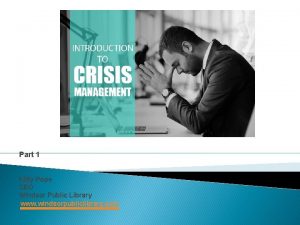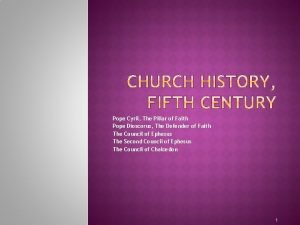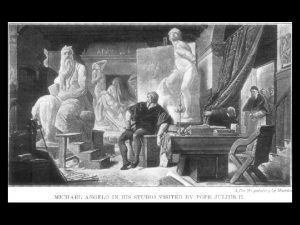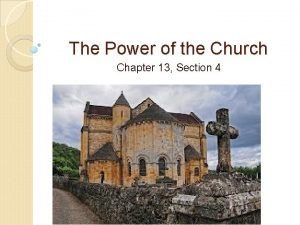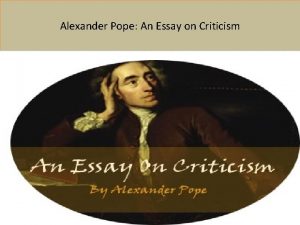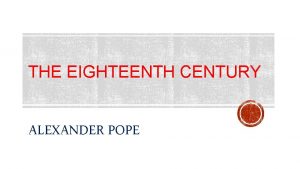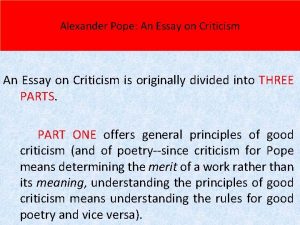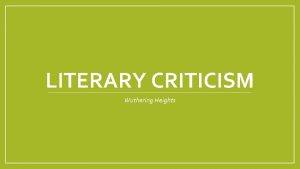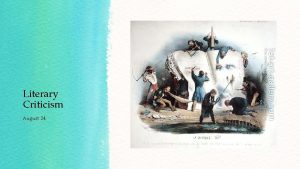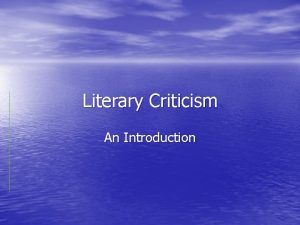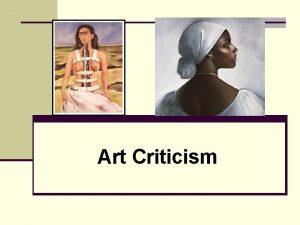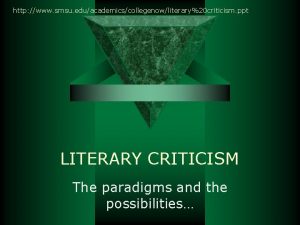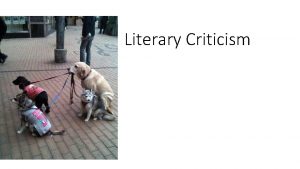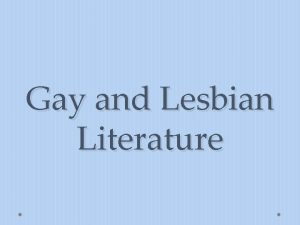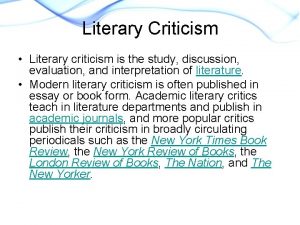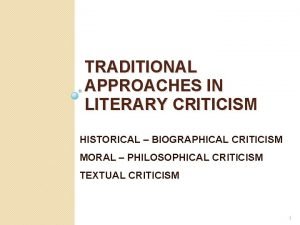AN ESSAY ON CRITICISM Alexander Pope ALEXANDER POPE



















- Slides: 19

AN ESSAY ON CRITICISM Alexander Pope

ALEXANDER POPE 1688 - 1744

His Life… Pope was born in London Devout Catholics, his family moved to a quiet home in the country to avoid the conflicts in London Because of the laws against Catholics, Pope was educated at home and in private schools He was mostly self-taught; he could read and write in several languages

Pope suffered from a form of tuberculosis that affected his bones; he was short and had many lung issues He never married, although he had several women with whom he exchanged letters for many years Pope was able to meet many important literary figures in his early years because he was determined to be well educated

Pope’s family dealt with financial difficulties because of their religious beliefs; however, his translation of Homer’s works into English solved his economic woes and he bought a beautiful home in the country Pope died quietly at home, surrounded by friends

His Work… His influence on literature caused the period to be known as the “Age of Pope” In addition to translating Homer, he also produced a volume of Shakespeare’s work and contributed to The Spectator and The Guardian, popular newspapers of the day Pope was best known for his satire, produced in the form of “heroic couplets” He freely criticized whatever he saw that hurt society

Literary Terminology Literary Criticism – Describing, analyzing, and judging a literary work Aphorism – a brief statement, often witty, that expresses a principle, truth, or observation about life Epigram - a rhetorical device that is a memorable, brief, interesting and surprising satirical statement

About the Selection This piece was written when Pope was only 21 It gives guidelines for identifying quality literature One interesting point he makes is that it is better to be ignorant and write nothing than to be poorly educated and write foolishly He also believed that realism and reason were to be preferred in literature and art He was highly praised by his peers, and Samuel Johnson said that his place among literary greats was sealed with this piece alone The capitalization and spacing are those used by Pope

Class Work Read and discuss Pope’s essay Complete the Heroic Couplets worksheet

GULLIVER’S TRAVELS Jonathan Swift

JONATHAN SWIFT 1667 - 1745

His Life… Swift was born in Ireland when England “owned” Ireland did not take care of its property Swift’s father died before Swift was born, so he was sent to live with relatives in Ireland where he was given an excellent education Because Swift’s family was English, he was able to travel freely between England Ireland until there was serious political trouble in Ireland

After Swift returned to Ireland he was given a position with a former government official Swift traveled between England Ireland several times, earning a degree from Oxford University Frustrated that his employer was not helping him getting a better position, Swift became a priest in the Church of Ireland; at first he was miserable in his new career Swift moved back to Ireland, earning his doctorate degree and pastoring a small congregation

Swift became more politically active, and this activity often hurt his chances of good appointments for his church career; in the meantime his writing career began to improve After Queen Anne took power, he returned permanently to Ireland continued his writing; many of his political pamphlets supporting the people of Ireland were very controversial

Swift befriended Alexander Pope, and he visited Pope twice in England On the second visit, Pope help Swift publish his new book, Gulliver’s Travels, which was immensely popular Swift returned to Ireland; the last years of his life were very difficult He lost several close friends, suffered from mental illness (probably the result of a stroke), and even refused to speak for the term of a year Swift died a few months after Pope; he is

His Work Swift is known for his political pamphlets which “call out” the men he saw as harmful to Ireland its people His prose work, mostly satirical, fills a dozen volumes He also wrote poetry and fiction Gulliver’s Travels is considered his masterpiece, and A Modest Proposal impacted society greatly

Literary Terminology Satire - A literary work that mocks or ridicules the stupidity or vices of individuals, groups, institutions, or society in general

About the Selection Swift wrote the pieces as a mock travelogue, popular at the time This section comes from part three of the novel The floating island of Laputa is inhabited by people Swift sees in the British government: “shortsighted and impractical intellectual” men who experiment with society He believed that they put more faith in science than in truth

Class Work Read the selection Literary Critique, page 309, #s 1 -4 Complete the writing assignment (handout)
 Alexander pope the rape of the lock
Alexander pope the rape of the lock Alexander pope sound and sense
Alexander pope sound and sense Introduction of the rape of the lock
Introduction of the rape of the lock The difference between criticism and constructive criticism
The difference between criticism and constructive criticism Formalist theory in literature
Formalist theory in literature Descriptive criticism vs prescriptive criticism
Descriptive criticism vs prescriptive criticism Define historical criticism
Define historical criticism Psychological criticism essay
Psychological criticism essay Psychological criticism essay
Psychological criticism essay Formalist approach example
Formalist approach example Alexander graham bell essay in english
Alexander graham bell essay in english Vicky pope
Vicky pope Ad altare dei answers chapter 1
Ad altare dei answers chapter 1 Dick winters leadership
Dick winters leadership Pope gregory iii
Pope gregory iii Windsor public library ceo
Windsor public library ceo Pope dioscorus i of alexandria
Pope dioscorus i of alexandria Ted doru pope
Ted doru pope Tomb of pope julius ii
Tomb of pope julius ii Chapter 13 section 4 the power of the church
Chapter 13 section 4 the power of the church

